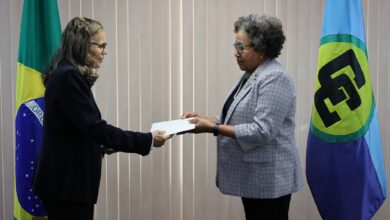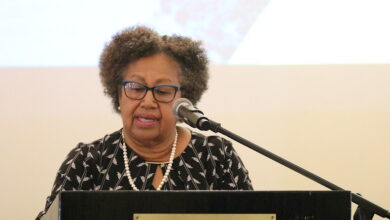I speak to you this evening on behalf of Ambassador Irwin LaRocque, the CARICOM Secretary-General who, unfortunately, is out of the country.
Caribbean Week of Agriculture (CWA) has come to be known as the premier agriculture event in the Caribbean and rightly so. After 14 years, CWA is increasingly becoming the ‘go-to’ event in which stakeholders from across the Region meet to discuss issues of importance to the Region. The increasing fervour of successive host countries to produce a ‘week to remember’ emphasizes the importance of agriculture for our individual Member States and the presence of so many stakeholders across the agriculture value chain no doubt augurs well for an exciting and productive week of activities.
This year CWA returns to Guyana after last being held here 10 years ago. As we know, agriculture is one of the major contributors to the Guyana economy, and among CARICOM Member States Guyana is perhaps the leading country in respect of self-sufficiency in food production as well as the lead agricultural exporter to other CARICOM countries. Guyana’s potential to contribute considerably to Regional food security should therefore not be underestimated. It is also noteworthy that the President of Guyana, His Excellency, Donald Ramoutar, is the CARICOM Lead Head of Government for Agriculture in the Quasi Cabinet of the Heads of Government of CARICOM.
Agriculture has always held high priority on CARICOM’s agenda in light of its contribution to the development of Caribbean economies. Over the years we have seen agriculture grown from a sector focused on primary production to one of significant interventions throughout the value-chain.
Heads of Government in seeking to address the current problems of high levels of debt and low levels of growth in our Member States have established a Commission on the Economy which will give priority to stabalisation, resource mobilisation and employment together with energy and ICT. This will be done within a context of innovation and enhanced competitiveness.
Agriculture has been identified as one of the key sectors that can engender growth and economic development in Caribbean economies and has been targeted for investment at both public and private sector levels. It is therefore appropriate that the theme for this year’s CWA is Linking the Caribbean for Regional Food and Nutrition Security and Rural Development. This lends itself so easily to the focus on increased production and exports.
In seeking to address the issue of food and nutrition security, therefore, we must seek to create that link between agriculture and the overall economic growth of the Region. Over the years several policy frameworks have been developed and are being implemented in support of the sector. We now have a Community Agricultural Policy (CAP) which sets out long-term and immediate priorities. The CAP will soon be supported by an Action Plan to help individual countries to implement the policy at the national level. We also have a fully elaborated Regional Food and Nutrition Security Policy and Action Plan which Member States have started implementing. These policies are particularly designed to arm farmers, producers, agro-processors and exporters with the right strategies to increase production and gain larger market share.
Key to the success of these policies, however, is the ability to implement at the national level. Our Regional institutions and bodies like the Caribbean Agri-Business Association (CABA), the Caribbean Farmers Network (CAFAN) and the Caribbean Agricultural Research and Development Institute (CARDI), have a critical role to play given their interaction with stakeholders at all levels. As CWA illustrates, the support of other agricultural institutions like the Inter-American Institute for Cooperation on Agriculture (IICA), the Food and Agriculture Organisation (FAO) and the Technical Centre for Agricultural and Rural Cooperation (CTA) are integral to the success of our initiatives.
It is not possible to deliberate on regional agriculture matters without dealing with the still vexing issue of transportation in all its dimensions. It is indeed timely that the Heads of Government of CARICOM at their last meeting had, as a central focus, Transportation in the Region, and, preparatory to that, the Council for Trade and Economic Development (COTED) met to advise, inter alia, on the transportation of agriculture produce. The result has been the establishment of a Transportation Commission. Some of the issues we have to address relate to the high cost of regional air and sea transportation. For example, freight costs between Antigua and Barbuda, and Guadeloupe and Martinique are twice as high as freight costs from France to Guadeloupe. Further, the Special COTED on Transportation held earlier this year agreed that key stakeholders including the Caribbean Shipping Association, LIAT, producers and exporters meet to discuss the issue of availability of adequate transportation to move goods from one country to the next.
Mr. Chairman, as the Region continues its journey towards a food secure Community we must also create that link with efforts to reduce the food import bill which is estimated to be more than US$4 billion. While it is not feasible, nor is it possible to produce all our food, it is crucial that we target those categories of food imports that can be profitably produced in the Caribbean and are necessary for food and nutrition security. A large segment of our food imports go directly into tourism and the growing fast food sector. This is one area that we should be able to target but it requires that we arm ourselves with detailed information on the products involved, the form in which they are imported and the cost factors that have to be addressed. There are some encouraging signs that we are making progress in penetrating the tourism and fast food industries, particularly in products like poultry.
As we continue the process of implementation, we must use the infrastructure of the CARICOM Single Market and Economy (CSME) and the expanded space for trade, investment and innovation that it creates. Regional industries should therefore move to take advantage of the removal of all barriers to the trade in goods and services, and the movement of capital and skills. The more cross-border investment takes place, the greater the opportunities for employment, productivity and growth. The agricultural sector is no different from any other in this respect. Though sanitary and phyto-sanitary measures which are critical in ensuring trade among CARICOM Member States and beyond could complicate our lives, it really should not. In this respect, we look forward to an operating Caribbean Agricultural Health and Food Safety Agency (CAHFSA) to smooth the process.
Mr. Chairman, within CARICOM, the productive sector of agriculture is not the only concern. We must also ensure that link between food security and nutrition security. Ensuring access to safe and nutritious food to meet dietary requirements and food preferences for an active and healthy lifestyle is equally important. As a Region we must ensure that Caribbean populations are armed with information that will enable them to make the right choices with respect to nutrition. Data has shown that the rate of non-communicable diseases otherwise known as ‘lifestyle’ diseases such as diabetes and hypertension are particularly high in the Caribbean. The risk of contracting such diseases is greatly lowered if we make the right dietary choices.
In closing, Mr. Chairman, as we focus this week on food and nutrition security let us ensure that in our discussions we keep in mind the need to create that link with production, the overall economic growth of the Region and the overall health of the Region.
I thank you.
AgricultureCaribbean Week of AgriculturePress ReleasesSpeeches






